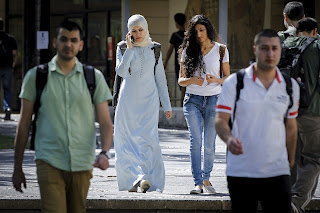In recent years, the ban on women wearing the hijab in Europe has sparked intense debates surrounding the notions of religious freedom, cultural identity, and women's rights. These bans, enacted in several European countries, have drawn attention to the complex interplay between personal beliefs, human rights, and societal norms. This blog delves into the ban on women wearing the hijab in Europe, while also examining the broader context of Muslim women's human rights.
The Hijab: A Symbol of Faith and Identity
The hijab, a headscarf covering the hair and neck, is a deeply symbolic religious garment worn by Muslim women as an expression of faith and identity. It holds profound cultural significance and has been a part of Islamic tradition for centuries. For many Muslim women, wearing the hijab is an integral aspect of their religious practice and personal identity.
The European Ban Phenomenon
Several European countries, most notably France, Belgium, and the Netherlands, have implemented bans on religious symbols in public spaces, including the hijab. Proponents of these bans argue that they are necessary to preserve the secular nature of society and prevent religious expression from interfering with public institutions. However, critics view these bans as a violation of religious freedom and an infringement on individual rights.
Balancing Secularism and Religious Freedom
The ban on women wearing the hijab brings to the forefront the tension between secularism and religious freedom. While European countries emphasize the importance of secular values, critics argue that these bans disproportionately target Muslim women and perpetuate discrimination. The principle of secularism is intended to ensure a neutral space for all citizens, but the enforcement of such bans can inadvertently marginalize specific religious groups.
Impact on Muslim Women's Employment and Education
One of the key concerns arising from the hijab bans is their impact on Muslim women's access to employment and education. Banning the hijab can limit opportunities for these women, as they may face reluctance from employers or educational institutions due to their religious attire. This leads to the question: Does the ban empower women by liberating them from perceived religious restrictions, or does it further restrict their choices by limiting their access to certain spheres of public life?
Human Rights of Muslim Women
Central to the discussion is the examination of human rights for Muslim women. The Universal Declaration of Human Rights clearly states that every individual has the right to freedom of thought, conscience, and religion. Advocates argue that banning the hijab infringes upon this right by coercing women into conforming to a specific secular identity, rather than allowing them to express their religious beliefs freely.
Agency and Empowerment
It is important to recognize that Muslim women are not a monolithic group, and their views on the hijab vary greatly. Some view it as a symbol of empowerment and a way to exercise agency over their bodies, while others may feel societal pressure to wear it. Banning the hijab removes the ability of these women to make a choice that aligns with their beliefs and values.
Promoting Inclusivity and Diversity
Europe's ban on the hijab also raises questions about the continent's commitment to multiculturalism and diversity. The bans risk alienating Muslim communities and sending a message that their practices are not welcome within society. Instead of fostering inclusivity, these bans can fuel divisions and hinder the harmonious coexistence of different cultural and religious groups.
Find a balance, respect other people beliefs
The ban on women wearing the hijab in Europe presents a multifaceted issue that touches upon religious freedom, cultural identity, and women's rights. While proponents of the ban argue that it upholds secular values, critics contend that it curtails individual freedom and perpetuates discrimination against Muslim women. As societies continue to grapple with the complexities of identity and diversity, it is imperative to find a balance that respects personal beliefs while fostering an inclusive environment for all.









No comments:
Post a Comment